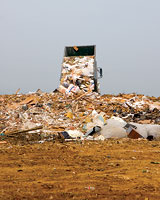“On its own, the material in this site might take 50 years to decompose. With the biodigester, that will happen in just 15 years.”
— Buncombe County General Services Director Bob Hunter
Bob Hunter, Buncombe County’s general services director, is charged with managing the county’s fleet, landfill, transfer station, litter control and recycling, along with environmental enforcement of illegal dumping, junk cars and hazardous waste. Nothing in that job description directly suggests what will quite possibly be his lasting legacy.

“This is the last landfill this county will ever have to build.” photos by Jonathan Welch
|
Gas.
Methane, to be specific. An end product of biological decomposition, methane is a potent greenhouse gas. On the flip side, when methane is burned it yields water vapor and carbon dioxide — also a greenhouse gas, but one with considerably less heat-trapping capacity, so the environmental impact of the methane is diminished. For that reason, use of landfill gas as a fuel is considered a source of green energy.
So Hunter explained during a midday field trip to Buncombe’s Solid Waste Facility in late June. The visit was sponsored by the Council of Independent Business Owners. With Hunter serving as a jovial trash talker/guide, two dozen CIBO members and guests nibbled on box lunches while touring the landfill in a plush Young Transportation bus.
As it happens, Hunter explained, the mixture of material that ends up in a landfill is a great source for methane, and simply burning the methane is beneficial enough that the Environmental Protection Agency requires landfill operators to drill wells, tap the gas and ignite escaping fumes, a process called flaring off.
Flaring off is fine as far as it goes, Hunter noted, but a better trick is to use the combustion process for power generation. Under his management, the county’s old landfill is already being tapped for fuel. An onsite generation plant pumps enough electricity into the grid to power 650 homes, making it a significant contributor to the state’s “green power” program, and UNCA is moving forward with plans for a craft-studio complex that will use the gas for pottery and glass kilns. At the same time, Hunter has introduced one natural-gas-powered vehicle to the county fleet and intends to add others that can eventually be operated on the free methane as well.
But that’s only the beginning of the greening of the county’s garbage operations. Hunter wanted the new landfill to move from simply tapping gas after the fact to proactive gas generation. In operation since 1997, the facility was designed from the ground up to be an active bioreactor, digesting garbage at an accelerated rate. To that end, a system of pipes and pumps is laid in each cell of the landfill during construction. The wastewater that runs down through the layers of garbage is pumped back to the top of the pile, where it drains back through the mound, over and over. The added moisture accelerates decay, so more gas is available sooner than under “natural” decay conditions.
Furthermore, with this approach, the material decreases in volume more quickly. “On its own, the material in this site might take 50 years to decompose,” Hunter said. “With the biodigester, that will happen in just 15 years. What that means is that we will gain that much more space for new material in the future.”
One key measure to extend the lifespan of the facility, he explained, is covering the garbage with paper instead of dirt. In many landfills, each day’s refuse is covered with six inches or so of soil. The dirt reduces the smell and helps ward off animal and insect intrusion, but it can add more than 150 feet per year to the height of a fill. So at the Buncombe landfill, Hunter has introduced use of a hydroseeding machine — the gizmo used to stabilize fresh-cut banks along highways and construction sites by spraying a sticky mixture of water, paper mash, cement and grass seed. They omit the seed in the process, Hunter said, “and we save six inches of landfill space every day.”
It will take additional alterations to fully maximize decomposition speed and gas production, Hunter said. For example, the landfill will likely require more water than the surface absorbs through rainfall during dry summer months, so he has obtained a permit to begin tapping the French Broad River for irrigation.
Because of measures like these, Hunter predicts, “this is the last landfill this county will ever have to build.”



Before you comment
The comments section is here to provide a platform for civil dialogue on the issues we face together as a local community. Xpress is committed to offering this platform for all voices, but when the tone of the discussion gets nasty or strays off topic, we believe many people choose not to participate. Xpress editors are determined to moderate comments to ensure a constructive interchange is maintained. All comments judged not to be in keeping with the spirit of civil discourse will be removed and repeat violators will be banned. See here for our terms of service. Thank you for being part of this effort to promote respectful discussion.